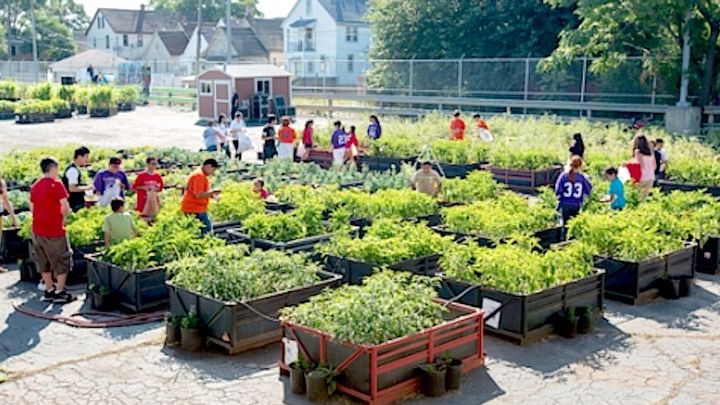
Gardening in the city-Community Garden
Donation protected
We believe that urban agriculture can be beneficial to the environment, and to the health and wellbeing of community members. The introduction of community gardens may be able to reduce the impact of food deserts in low-income areas and allow residents greater access to nutritious food that is necessary to live a healthy life.
Community gardens can mitigate some of the problems that plague urban areas. They can be a beneficial addition to many communities by increasing the availability of nutritious foods, strengthening community ties, reducing environmental hazards, reducing food miles and creating a more sustainable system.
Community gardens can help reduce negative environmental impacts by promoting sustainable agriculture; reducing food transportation costs and reducing water runoff. Humans, plants and animals can all benefit from urban agriculture since it creates habitats and improves the ecology of the area.
Community gardens:
Help improve air and soil quality
Increase biodiversity of plants and animals
Reduce “food miles” that are required to transport nutritious food
Can replace impervious structures and improve water infiltration
Can reduce neighborhood waste through composting
Positively impact the urban micro-climate
Poor nutrition and obesity are both challenges to low-income neighborhoods. Low accessibility to nutritious foods can cause health problems to residents located in food deserts. The addition of gardens to these areas may improve nutrition and increase the consumption of fruits and vegetables.
Positive Impact:
Gardens in urban areas are positively correlated with decreased crime rates
Vacant lands can lead to crime which can detrimentally impact the health of residents
Residents in areas with high crime rates may experience cardiovascular disease and mental health disorders
The consequences of vacant lands are decreased property values, drug use, and the illegal dumping of litter, tires and chemicals
Gardens can improve economic opportunities by training volunteers and selling food at farmers’ markets
Urban agriculture can teach residents useful skills in planning, food production and business
We are asking for donations for supplies and resources needed for this community garden to help decrease the impact of food deserts in South Macon's Rutherford Ave which is considered a low-income community.
We are striving to provide long-term food security by supporting local agriculture projects while also improving economic, social and environmental problems.
Community gardens can mitigate some of the problems that plague urban areas. They can be a beneficial addition to many communities by increasing the availability of nutritious foods, strengthening community ties, reducing environmental hazards, reducing food miles and creating a more sustainable system.
Community gardens can help reduce negative environmental impacts by promoting sustainable agriculture; reducing food transportation costs and reducing water runoff. Humans, plants and animals can all benefit from urban agriculture since it creates habitats and improves the ecology of the area.
Community gardens:
Help improve air and soil quality
Increase biodiversity of plants and animals
Reduce “food miles” that are required to transport nutritious food
Can replace impervious structures and improve water infiltration
Can reduce neighborhood waste through composting
Positively impact the urban micro-climate
Poor nutrition and obesity are both challenges to low-income neighborhoods. Low accessibility to nutritious foods can cause health problems to residents located in food deserts. The addition of gardens to these areas may improve nutrition and increase the consumption of fruits and vegetables.
Positive Impact:
Gardens in urban areas are positively correlated with decreased crime rates
Vacant lands can lead to crime which can detrimentally impact the health of residents
Residents in areas with high crime rates may experience cardiovascular disease and mental health disorders
The consequences of vacant lands are decreased property values, drug use, and the illegal dumping of litter, tires and chemicals
Gardens can improve economic opportunities by training volunteers and selling food at farmers’ markets
Urban agriculture can teach residents useful skills in planning, food production and business
We are asking for donations for supplies and resources needed for this community garden to help decrease the impact of food deserts in South Macon's Rutherford Ave which is considered a low-income community.
We are striving to provide long-term food security by supporting local agriculture projects while also improving economic, social and environmental problems.
Organizer
Jimmy Coleman
Organizer
Macon, GA